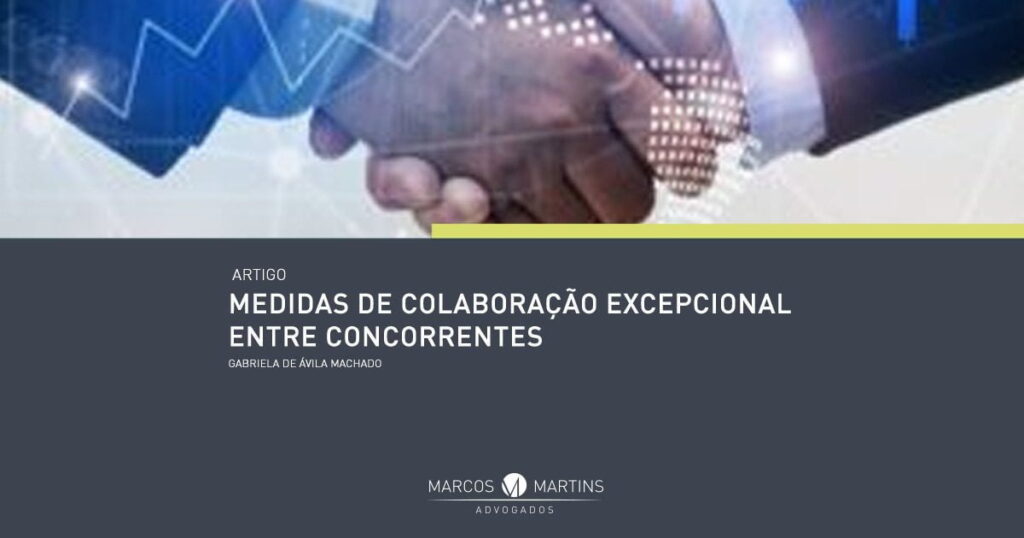Gabriela de Ávila Machado
Lawyer at Marcos Martins Advogados
The times we are living in are demanding more and more from companies and consumers. The world is going through such difficulties that exceptional measures are necessary.
In this sense, on May 28, 2020, CADE (Administrative Council for Economic Defense), the Brazilian competition defense agency, authorized collaboration between competing companies. The decision[1], published on June 4, 2020, allowed Ambev, BRF, Coca-Cola, Mondelez, Nestlé and Pepsico, with the aim of minimizing the effects of the pandemic of the new coronavirus (Covid-19), to collaborate together on a project called “We Movement”.
According to the companies involved, the project aims to recover the activity of small retailers by bringing “greater capacity to produce effective results and on the necessary scale in order to help commercial establishments resume their activities”[2]. The agreement is due to run until October 31, 2020 and may be extended if the pandemic scenario evolves.
CADE justified the decision on the basis of plausible economic justification and the adoption by the parties of antitrust risk prevention protocols. In addition, the decision is also based on international recommendations and the exceptional nature of the situation faced, and according to the text of the decision, the activities carried out also do not involve the exchange of competitively sensitive information between the parties.
In “normal” times, this collaboration could never be approved since, according to Alexandre Barreto (CADE’s president), sharing information between competitors in this way could eventually lead to risks to the economic order. The president emphasized: “(…) the exceptional nature of this measure does not constitute antitrust immunity. This decision does not confer immunity on the petitioners, so there is no impediment to this Council, in the event of observing any irregularities in the terms presented or practices potentially harmful to competition within the scope of this agreement, to take the measures and steps it deems appropriate.”
Previous cases
This is not the first time that the world has encountered situations in which collaboration between collaborators has been permitted.
Following the 2011 nuclear disaster in Fukushima, Japan, caused by an earthquake, the Japan Fair Trade Commission published an article on “Examples of Anti-Competitive Acts During the Earthquake Disaster and Other Emergencies ” [3]
In 2015, an Antitrust Guide was issued which allowed for the possibility of combining certain resources to assist communities affected by hurricanes Katrina and Rita In the same vein, in 2017, due to hurricanes Harvey and Irma, the US DoJ (Department of Justice) published the “Antitrust Guidance, Hurricanes Harvey and Irma”[4], clarifying the possibility of two or more companies joining together to bring products or services needed by consumers affected by the disasters
International recommendations
Below we list some recent international decisions on measures authorizing collaboration between competitors:
Canada: collaboration between groups to guarantee access to items and services necessary for life for all Canadians (Canadian Competition Bureau: “Statement on competitor collaborations during the COVID-19 pandemic”[5]);
Coordination to limit purchases of certain products by consumers, sharing of stock information and product shortages, sharing of labor and real estate, coordination on opening and closing times, among others (UK Government, “Public Policy Exclusion Order 2020 No. 369”[6]);
Collaboration between pharmaceutical companies for the cross-supply of raw materials for the production of essential medicines (European Commission, comfort letter called “Medicines for Europe ” of April 8, 2020[7]);
Joint purchasing agreements between healthcare providers to increase efficiency and reduce costs (US Department of Justice and Federal Trade Commission: “Joint Antitrust Statement Regarding COVID-19”[8]);
Co-operation between the Australian Banks Association and banks to provide supplementary packages for individuals and businesses affected by COVID-19 (extension of payment terms, among others) (ACCC: “Banks authorised to co-operate on loan relief and services”[9] );
Announcement by the Mexican Commission for Economic Competition that it would not process collaboration agreements that, in the current circumstances, were necessary to maintain and increase supply, satisfy demand, avoid shortages, etc., and that were not carried out with the aim of harming competitors (“Postura de la COFECE en términos de la aplicación de la Ley Federal de Competencia Económica ante la emergencia sanitaria”[10]);
Block exemption from anti-competitive rules for the transport sector for three months in Norway, announced in March 2020.
On May 26, 2020, the Organization for Economic Cooperation and Development (“OECD”) began releasing articles on cooperation between competitors in times of pandemic, the first of which was the opinion entitled “Cooperation between competitors in times of COVID-19”[11]. According to the body, collaboration between collaborators can benefit the economy and consumers and may be legally possible, but requires a thorough analysis of the case and the challenges involved.
In this opinion, it is explained that collaboration can benefit consumers in various ways, such as ensuring access to essential services or the distribution of essential goods (food, water, hygiene products, among others). However, it is emphasized that decisions on such collaborations must take into account:
- The benefit actually brought to consumers and society as a whole;
- The measures taken to avoid distortion of competition in the long term;
- The duration of the collaboration, which must have a fixed term;
- Measures to prevent the disclosure of trade secrets (such as confidentiality clauses).
The Opinion also sets out some good practices that should be followed by the competent authorities, such as summary and priority analysis of cases of collaboration during the pandemic, remaining vigilant and monitoring price increases.
Brazilian scenario
CADE set up, by means of CADE Ordinance 248/2020, a Working Group to prepare a document with guidelines on collaboration between competitors, in line with what has been discussed above, and on July 6, CADE published the “Temporary Informative Note on Collaboration Between Companies to Deal with the Covid-19 Crisis”[12]. The Note sets out the general guidelines for collaboration between economic agents and the procedures to be followed in such cases.
The Note explains that CADE will take into account the scope of the collaboration, the temporal duration (which should be limited to the necessary period), the territory, governance, transparency and good faith, compliance programs, the care of confidential information, among others.
Finally, the Note refers to Law 14.010/2020, which, in its article 14, suspends the effectiveness of item IV of article 90 of Law 12.529/2011, for acts carried out and in force between March 20 and October 30, 2020 (or for the duration of the State of Public Calamity). Thus, if two or more companies enter into an associative contract, consortium or joint venture, there will be no obligation to notify CADE However, this act may be analyzed later, in order to determine whether the agreements that are not necessary to combat or mitigate the effects of the pandemic violate the economic order.
[1] CADE. Confidential Presidential Order No. 99/2020. Available at https://sei.cade.gov.br/sei/modulos/pesquisa/md_pesq_documento_consulta_externa.php?DZ2uWeaYicbuRZEFhBt-n3BfPLlu9u7akQAh8mpB9yMNI4DqLKThtJqDd-C6ltFgy5_4XbZDL67FA3TgZQ4nUHFDudanfQ2iCHfVSebm2JueE56EOwGAswJlHRdF2ABb.
[2] CADE authorizes collaboration between Ambev, BRF, Coca-Cola, Mondelez, Nestlé and Pepsico due to the new coronavirus crisis. CADE, 2020. Available at http://www.cade.gov.br/noticias/cade-autoriza-colaboracao-entre-ambev-brf-coca-cola-mondelez-nestle-e-pepsico-devido-a-crise-do-novo-coronavirus. Accessed on July 2, 2020.
[3] “Examples of Antimonopoly Act Applications during the Earthquake Disaster and other Emergencies” (March 2012, https://www.jftc.go.jp/soudan/shinsaikanren/index_files/souteijirei.pdf)
[4] Antitrust Guidance – Hurricanes Harvey and Irma. Available at https://www.justice.gov/atr/page/file/996516/download.
[5] Competition Bureau statement on competitor collaborations during the COVID-19 pandemic. Available at https://www.canada.ca/en/competition-bureau/news/2020/04/competition-bureau-statement-on-competitor-collaborations-during-the-covid-19-pandemic.html.
[6] The Competition Act 1998 (Groceries) (Coronavirus) (Public Policy Exclusion) Order 2020. Available at http://www.legislation.gov.uk/uksi/2020/369/contents/made.
[7] Coordination in the pharmaceutical industry to increase
production and to improve supply of urgently needed critical hospital medicines to treat COVID-19 patients. Available at https://ec.europa.eu/competition/antitrust/medicines_for_europe_comfort_letter.pdf.
[8] Joint FTC-DOJ Antitrust Statement Regarding COVID-19. Available at https://www.ftc.gov/public-statements/2020/03/joint-ftc-doj-antitrust-statement-regarding-covid-19
[9] https://www.accc.gov.au/media-release/banks-authorised-to-co-operate-on-loan-relief-andservices
[10] COFECE’s Position on the Application of the Federal Law on Economic Competence to the Health Emergency. Available at https://www.cofece.mx/postura-cofece-ante-emergencia-sanitaria/.
[11]Co-operation between competitors in the time of COVID-19. Available at https://www.oecd.org/competition/Co-operation-between-competitors-in-the-time-of-COVID-19.pdf. Accessed on July 3, 2020.
[12] Temporary information note on cooperation between companies to deal with the Covid-19 crisis. CADE, July 2020. Available at http://www.cade.gov.br/noticias/nota-informativa-temporaria-sobre-colaboracao-entre-empresas-para-enfrentamento-da-crise-de-covid-19.pdf.








